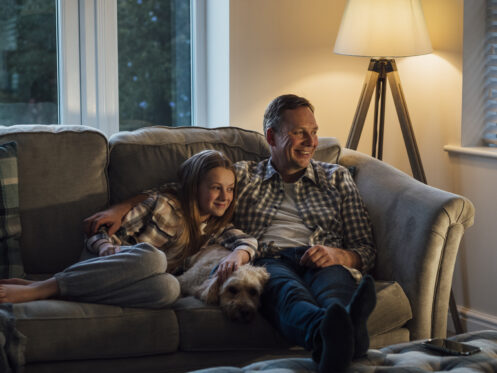In the past, heat pumps weren’t really an option for heating homes in Canada since older units didn’t work all that well in cold weather. Due to advancements in technology, most modern heat pumps can work in temperatures as low as -30 degrees Celsius while using much less energy than a furnace or any other type of heating. A heat pump is normally going to be the least expensive option for heating your home. However, this isn’t always the case unless you take steps to ensure your heat pump is operating at its peak efficiency.
Regularly Replace the System’s Air Filter
One of the most critical tasks for maintaining a heat pump or any other type of HVAC system to ensure it works effectively is replacing the air filter in the system. How often you need to replace the filter in your system depends on factors like how efficient the filter is and how many hours the system runs a day. Another factor is whether you have indoor dogs and cats since pet hair can quickly clog an air filter.
Generally speaking, three months is the longest you should go before replacing the air filter in an HVAC system. That said, you may need to change the filter in a heat pump system every month or two during the winter since the system will typically run for most of the day and night.
If the filter starts looking dark, replacing it will improve the performance of your heat pump and help it to heat more efficiently. That’s because a new filter ensures the system always has sufficient airflow. As an air filter gets dirty, it starts restricting airflow and reducing how much hot air the system puts out.
Don’t Turn the Temperature Down Too Far
Setting back your thermostat or turning the temperature down at times like when you’re at work and asleep is a good way to keep your heating costs lower. If you have a gas furnace, you can usually set the temperature back by around 5 degrees Celsius without much issue. With a heat pump, you really don’t want to ever turn the temperature down or at least not turn it down by more than 1 to 2 degrees, unless you have a dual-fuel system with a furnace as well.
If you just have a standard cold-climate heat pump system, the auxiliary electric heat strips will end up running as soon as you turn the temperature back up so your house gets hot more quickly. This leads to your heating costs increasing since the heat strips use far more electricity than your heat pump does.
Install a Smart Thermostat
If your home has a standard manual or programmable thermostat, replacing it with a high-quality smart thermostat can make a major difference in the energy efficiency of your heat pump. The best smart thermostats on the market have a variety of advanced features, many of which are specifically geared toward improving energy efficiency.
For instance, you can usually use the app to check how much energy your heat pump is using. You can even get recommendations on how to improve its efficiency by making small adjustments to your normal thermostat settings.
One major benefit of being able to monitor your HVAC system’s energy usage is that it makes it easy to determine if the system is still working efficiently. If you notice the energy usage is suddenly increasing and you haven’t made any changes to your thermostat settings, it’s a sign the system has an issue that’s preventing it from working as well as it should. That means you should have a professional inspect the system since it likely needs to be repaired or at least serviced.
Make Sure All of the Vents in Your Home Are Open
One of the biggest mistakes many people make when it comes to their heating (and air conditioning) is closing the supply vents in some rooms. The thought behind doing so is that, by closing the vents in unoccupied rooms, you can direct all of the heat to where it currently needs to go and lessen the amount of time your heating needs to run. Unfortunately, this isn’t the case. Instead, closed vents will actually lead to the system performing less effectively. That means it will end up using more energy than it would if all of your vents were open.
The reason that closed vents negatively impact an HVAC system’s performance has to do with something known as static pressure, which is the measurement of the amount of resistance the air flowing through a ductwork system encounters. For an HVAC system to work efficiently and effectively, there needs to be the same volume of air coming into the system as there is coming out.
When some vents are closed, hot air continually builds up in the ducts that supply those vents. That quickly leads to the pressure in the entire supply side of the ductwork system increasing, making it more difficult for the system to move air through all of the ducts, including the ones with open vents. The buildup of air in the supply ducts also leads to the system not being able to draw in as much air through the return duct system as it should, which further decreases the system’s performance.
Leave All Interior Doors Open
A similar mistake people make is keeping the doors to their bedrooms or other parts of the house closed. While having the door closed does help trap heat in the room, it also makes the heating system work less efficiently. That’s because air needs to be able to continually circulate throughout your house for the system to work as well as it should, and closed doors block off airflow and interfere with air circulation.
If you don’t have sufficient circulation, it often results in some parts of the house being much warmer and other areas being cooler. Depending on where your thermostat is located, this can result in your heat pump running more than necessary and your heating costs increasing.
Schedule a Professional Heat Pump Tune-up
The most important thing for maintaining a heat pump’s performance is to have it inspected and serviced twice a year. That means once in the spring before you need to run your air conditioning and then again in the fall before you need to turn the heat on.
Certain maintenance tasks like cleaning the coil inside your house and the coil in the heat pump are crucial for ensuring the system can heat (and cool) efficiently. The amount of electricity a heat pump uses at any time generally never changes. What does change if the system’s coils are dirty is the amount of heat it can transfer.
The reason heat pumps are so much more energy efficient than other heating units is that they use electricity to capture and transfer heat instead of just converting energy directly into heat. Most heat pumps are at least 300% efficient. That means for every unit of electricity a heat pump uses, it puts out three units of heat energy.
Nonetheless, if there’s an issue like a dirty coil or insufficient refrigerant, the efficiency can be greatly decreased. You can also end up with a heat pump not working effectively enough to keep your house sufficiently warm, resulting in the system having to rely on the auxiliary heating far more than it should.
If you need any home comfort services in the Victoria, BC area, Darias Heating & Air Conditioning has you covered. We pride ourselves on offering exceptional heating and air conditioning services and will work to ensure your needs are fully met. If you want to ensure your heat pump works efficiently this winter, contact us to learn all of the ways we can help.
Services We Offer include:


